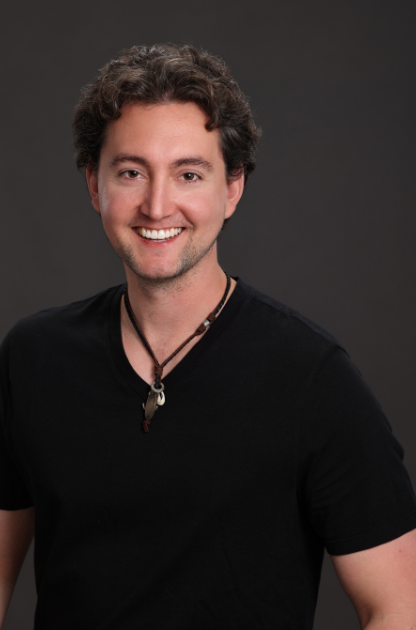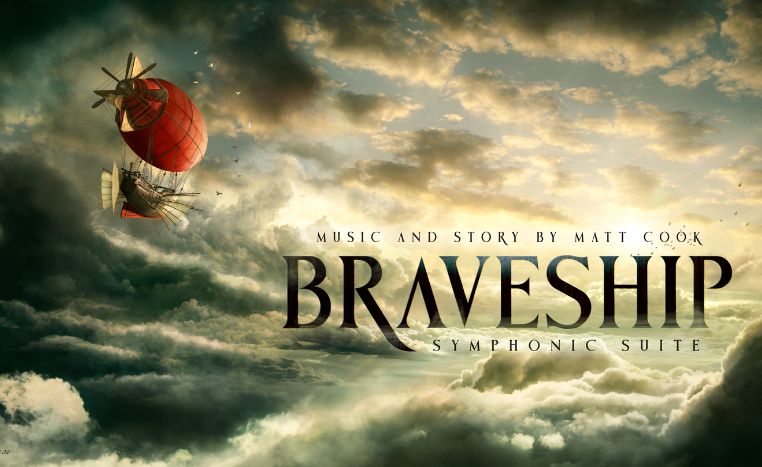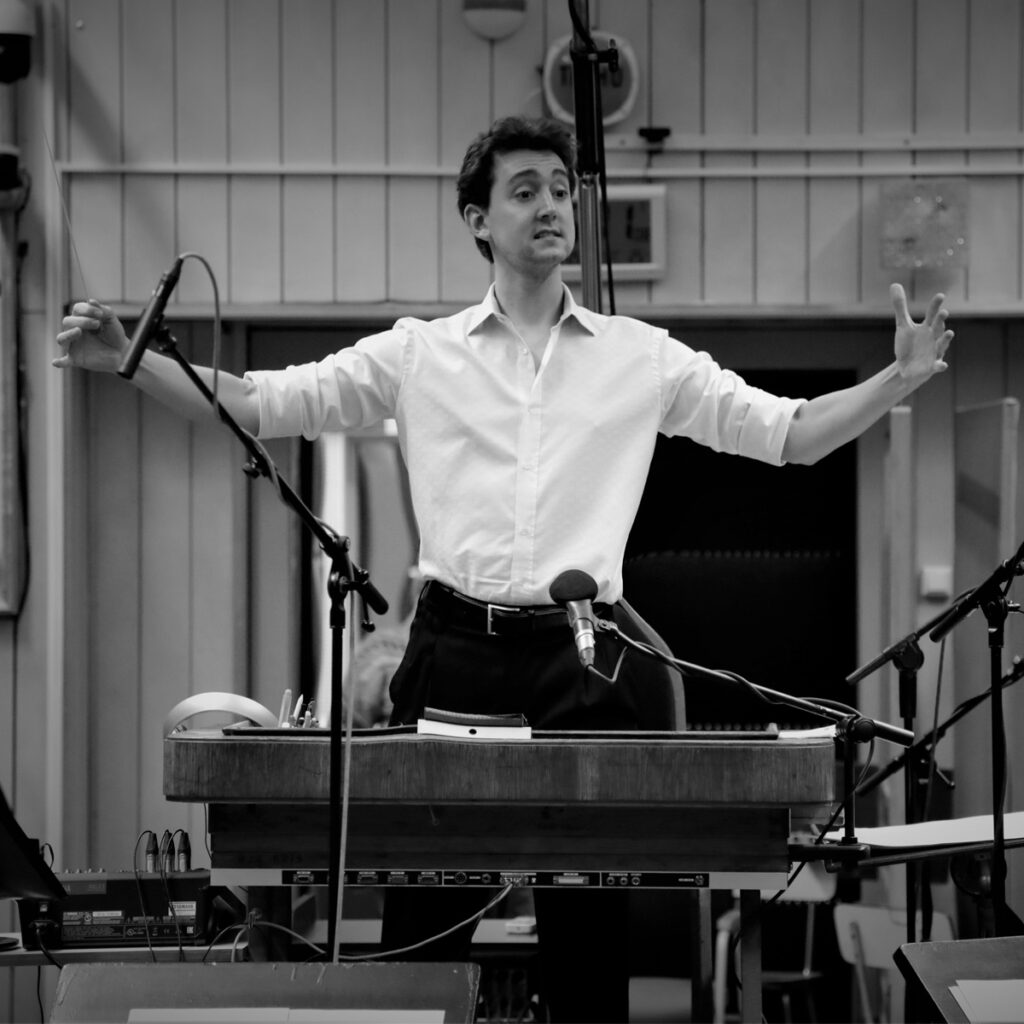Dr. Matt Cook’s work reflects a deep curiosity and a love for weaving together different forms of storytelling. As a composer, author, and game developer, he has taken a thoughtful approach to connecting music, narrative, and technology in his multimedia project, Braveship. In this interview with Crossover Music Magazine, Dr. Cook shares the joys and challenges of creating a symphonic suite, novel, and video game, offering insight into how these elements came together to tell a unique and imaginative story.

CMM: Matt, you’ve had an incredibly interesting career to date—taking that multi-passionate label very seriously! What are some of the joys of being involved in so many different areas?
Dr. Matt Cook: Thanks to you and Crossover Music Magazine for hosting this discussion, Natasha. It’s a pleasure to speak with you.
The pursuit of knowledge across a broad range of fields was historically more common than it is today, particularly during the Renaissance. Scholarly boundaries were less rigid then. Thinkers and creators navigated seamlessly between art, science, philosophy, and technology. In the last century, disciplines have become more specialized and academic fields increasingly compartmentalized. The once-celebrated ideal of broad, interconnected knowledge has declined and led to a culture that values depth over breadth. However, there’s something paradoxical about that. Because all knowledge is connected, it also takes breadth to have real depth.
I’ve got a perfect example for you that relates to music. People might wonder why music sounds good to the human ear. The answer is that the notes on our most familiar scales of music correspond to frequencies that have simple, low-integer ratios. For example, a ratio of 2:1 defines the octave. Ratios of 3:2 and 4:3 form intervals that musicians call “perfect,” and which monks in Medieval times revered for their perceived godlike quality. It also turns out that if you take a string and make it vibrate with different levels of energy, the only possible frequencies that string will generate will be integer multiples of the lowest possible frequency. This same principle guides the wave-like behavior of electrons, and it’s also why excited atoms emit only certain colors of light. How fascinating it is that our simple question of “why music sounds good” leads us in the direction of mathematics and immediately connects to quantum physics!
If you limit yourself to one field, you never get to see the bigger tapestry that connects all knowledge; you see only some of the threads that weave through it in particular places. I get such a kick out of following threads through as much of the tapestry as I can, and that means experimenting in different fields.
CMM: Do you ever feel stretched thin?
Dr. Matt Cook: Rarely. I love my work too much and know I’m far too stubborn to give up on a project or an idea even when there’s something more attractive or enjoyable in the short term. To-do lists, writing down thoughts before sleep—those help avoid moments of sheer panic when I feel I might drop the plate.
CMM: Braveship, much like its composer, is many things—an album, a novel, and a video game! What was the first spark of inspiration for this project?
Dr. Matt Cook: It started over a decade ago with a simple musical theme of thirty seconds that I had hoped would capture a spirit of ascension. When I played it for a dear friend, he heard it as literal ascent and said, “This calls to mind a rising hot air balloon.” I loved the visual but wanted a bigger aircraft that could be more purposeful in its direction and journey, so in my mind the hot air balloon became an airship.
Over the years I expanded the musical theme and played with the idea of a story: a young orphan boy discovers the airship and flies it to faraway lands, discovering the family he never had along the way. I wanted the lands to be isolated. Floating continents, otherwise unreachable without the airship, made for infinite story potential. Each continent could have evolved with its own flora, fauna, and culture, calling for a unique musical theme and sound palette and offering distinct opportunities for danger, intrigue, and adventure.
In time it became clear that I had inadvertently become a passenger onboard this magical vessel, much like the young orphan in the story. I’d like to say it was all deliberate from the get-go, all planned out from start to finish, but that’s not how it happened. Not really. There was, however, a moment when I decided to seize the helm wheel, plot a course, and guide the ship as its captain. When it all crystallized, I became intentional about writing this story as a symphonic suite with an accompanying novel and game.
CMM: What have been some of your favorite musical elements that bring the magic of Azra’s story to life?
Dr. Matt Cook: I’ll speak to two elements: theme and orchestration.
One could create a whole hierarchy of musical concepts, from frequencies to harmony and melody and many others. Theme lives at the top of that hierarchy. In the art of musical storytelling, theme is what provides and drives a sense of purpose for the listener. It is the centerpiece around which the other ideas are organized. It’s quite possible to have music that is merely textural in quality, not thematic—but music of that sort can’t convey movement or purpose or a feeling of going somewhere. Since this story takes listeners on a journey, I wanted the Braveship Suite to be full of thematic material that would provide a unique character for each of the lands visited by Azra and the Braveship’s crew.
With respect to orchestration, every instrument in the orchestra has a special feature—a solo, cadenza, or otherwise exposed passage—so people new to symphonic music can hear the beauty and richness of each unique timbre on its own.
CMM: What was the process like for Braveship? Did you write a chapter and then score it, revise, etc., or did you finish the novel first and then progress to the score?
Dr. Matt Cook: It began with a single musical theme, the “Ascension” theme, and the concept of a young orphan boy traveling on his airship. At times I’d zone into particular moods or feelings from his journey—not enough to support writing words on the page, but enough to put notes on staves; music can conjure up a mood without calling particular concepts to mind. Other times I’d work strictly on plot, mapping out the course for Azra and his companions aboard the Braveship without regard for the score. Then there were times when story and music came into existence together harmoniously, as was the case for movements/chapters like the March of the Ants and Necklace of Memory.
Overall, the two key processes entailed creating new elements and integrating unplaced elements. The latter felt like solving a jigsaw puzzle without a reference picture. And there were many, many variables to keep in mind. The music and the story had to offer constant change and variety, and their emotional dynamics had to match. When the demands of the music clashed with the demands of the plot, that meant some puzzle piece didn’t fit—and there was no way out but to rethink and revise.
CMM: The experience of bringing Braveship to a live audience is meant to be quite immersive. Can you tell us what viewers can expect?
Dr. Matt Cook: Classical audiences are dwindling. We’re seeing a decline in popularity, particularly among younger audiences who gravitate toward contemporary genres like pop and electronic music. But it’s not just other music genres that classical music has to compete with. It’s all the other more commercial forms of entertainment: social media, gaming, and film and TV that people can stream from the comfort of their homes. I believe the solution is not merely to improve musical education, but also to enhance program offerings so that classical performances can become exciting, competitive forms of entertainment in the modern era.
I hope Braveship will help revitalize the classical genre by showing what can be done in the way of multimedia. Braveship is performed with the full symphony orchestra and a choir. Between movements, a narrator tells Azra’s story, providing context for the music. The music is accompanied by dozens of illustrations and animations depicting the Braveship’s voyage, all projected on a giant screen. The finale, “Fly with Me,” introduces a new performer—the featured soprano. The idea is for the audience to feel like we’re right there aboard the ship alongside Azra and his crew, on a spectacular adventure together.
CMM: You released the first track from this new show, “Fly With Me,” featuring the incredible Australian soprano Mirusia. We love her, and her voice is PERFECT for this! Please tell us how your collaboration began.
Dr. Matt Cook: Couldn’t agree more. Mirusia is perfect for “Fly with Me.” She delivers the ultimate blend of sweetness, melancholy, and transcendence. Mirusia’s voice first enchanted me as she sang “Someday My Prince Will Come” on stage with André Rieu. I reached out to her manager and was delighted to hear from him that she felt a personal connection with Braveship and this song in particular. Before recording, we met in Brisbane to get to know each other and talk about music and life. Mirusia is a genuine person filled with joie de vivre. She simply radiates warmth and authenticity. It’s important to me not only to produce great music, but also to have fun and to laugh along the way. Our meeting was full of laughter from the get-go. I knew from that moment I wanted to write more music just for her (and we have already recorded more together). That line from Casablanca came to mind. I said, “Mirusia, I think this is the beginning of a beautiful friendship.”
CMM: Braveship also features award-winning pianist Dr. Eva Schaumkell. At what stage did she become involved, and was she able to add any of her own unique touches?
Dr. Matt Cook: Eva is an extraordinary performer. I’m grateful to her for sharing her remarkable talent and virtuosity with Braveship as the album’s featured pianist from start to finish. The pianist faced several challenges, all of which Eva handled ever so deftly. For one, the musical suite contains some difficult passages, particularly in the buildup to the climax of March of the Ants, which Eva made look easy.
More than that, Eva had to learn an entirely new instrument: the celesta. Many people haven’t heard of that instrument but are familiar with its bell-like sound, as in the “Dance of the Sugar Plum Fairy” from The Nutcracker. The celesta looks like a miniature upright piano with smaller keys. The keys connect to hammers that strike metal plates or bars instead of strings. While the celesta is still operated by a keyboard, it has a completely different feel to the piano—different sensitivities, different tonal quality, different action. For recording purposes, Eva had only a few minutes to learn to play the celesta, and she nailed it! Her delicate touch captured the wondrous fairy-like magic of the instrument as if she were a career celestist.
The third challenge was the solitary nature of her recording. While the other performers sat together in a large room and could play off each other’s energy, Eva played all day long, for multiple days, from an isolation booth behind everyone else. That took tremendous stamina.
Eva and her husband Vijay Venkatesh, who have enthralled audiences around the world as the Vieness Piano Duo, have become dear friends. I look forward to more musical projects with both of them in years to come.
CMM: What stage is the video game production in? Have you had a chance to play it yourself yet?
Dr. Matt Cook: In the story, the Braveship itself is much more than an inanimate object. It does not speak or express thoughts but is portrayed as undeniably sentient and strong-willed. In fact, although it’s centuries old, it behaves as if it were an unruly teenager with a temper. Few have what it takes to pilot the Braveship. One must learn not to commandeer it, but to connect with it and persuade it to fly as desired. Since the Braveship is a character in its own right and one of titular significance, I had the idea for video game whereby the player discovers the origin story of the Braveship—as its builder—by solving puzzles and collecting the very artifacts that imbue the ship with its sentience and magic. The game is in development now. Its story takes place 500 years before the events of the novel. I’ve been intimately involved with every aspect of the game and puzzle design and have played it a lot—much more than any other player ever will, I think!
CMM: Finally, looking back at your creative journey, what moment stood out to you most while working on a large multimedia project like Braveship?
Dr. Matt Cook: I’ll share a very special one. On the second day of recording with the woodwinds and strings in the studio, we had fallen woefully behind schedule. By the end of the day, we still had a long, long way to go but had run out of time with the forty-five players. We were in disaster territory. The completion of the album was worse than uncertain. It was extremely unlikely. It felt as though we had intended to climb Mount Everest but had only reached base camp.
I stood at the podium before the virtuosos and explained the situation, recognizing they had fulfilled their contracts and no doubt had personal commitments and family obligations preventing them from extending their time. I suggested we take a ten minute “break,” offering thanks and farewells to anyone who preferred to leave or simply had no choice. I asked if anyone might be willing and able to stay on and go the extra marathon for Braveship. The idea was, we would see how many musicians came back to their seats after those ten minutes, and determine whether we could still climb the mountain and finish. I was a little choked up on the podium, because we still had so far to go, and this was a big ask; the players were already exhausted. I ended by saying, “If you can, and if you’ll consider it . . . fly with me.”
The ten-minute break was a real nail biter. I went into another room and closed my eyes and racked my brain over how the hell we were going to finish recording. It looked bleak. It had been difficult getting everyone in the studio together. Several people had flown across country for this.
The break ended. I walked back to the sound stage and made my way to the podium, expecting a handful of players—four or five, tops.
When I looked out at the orchestra, every single seat was filled. All forty-five players were smiling back at me, having rearranged their schedules to return. Everyone. Then they all started clapping as one big team. Their message was clear: We’re in this together. Let’s get it done.
I was so moved, my eyes teared up. A few players later told me why they came back. Some felt a special connection with the music. Some had children who had enjoyed hearing them practice the Braveship tunes at home. Others came back because they felt I’d shown how much I cared about them. Whatever their reasons, each of the forty-five musicians touched me in a way I’ll never forget. In that moment we were all aboard the Braveship together. We were crewmates. And we were sailing.









